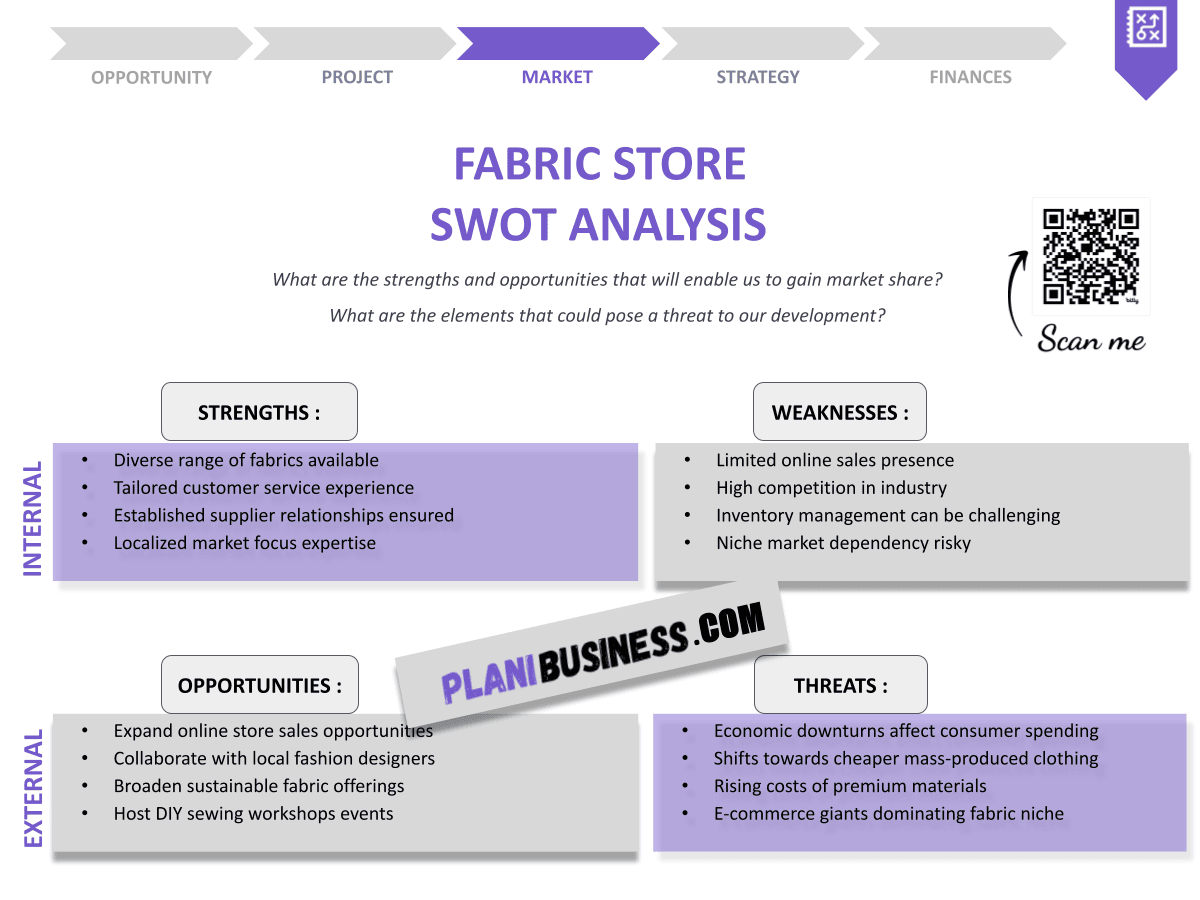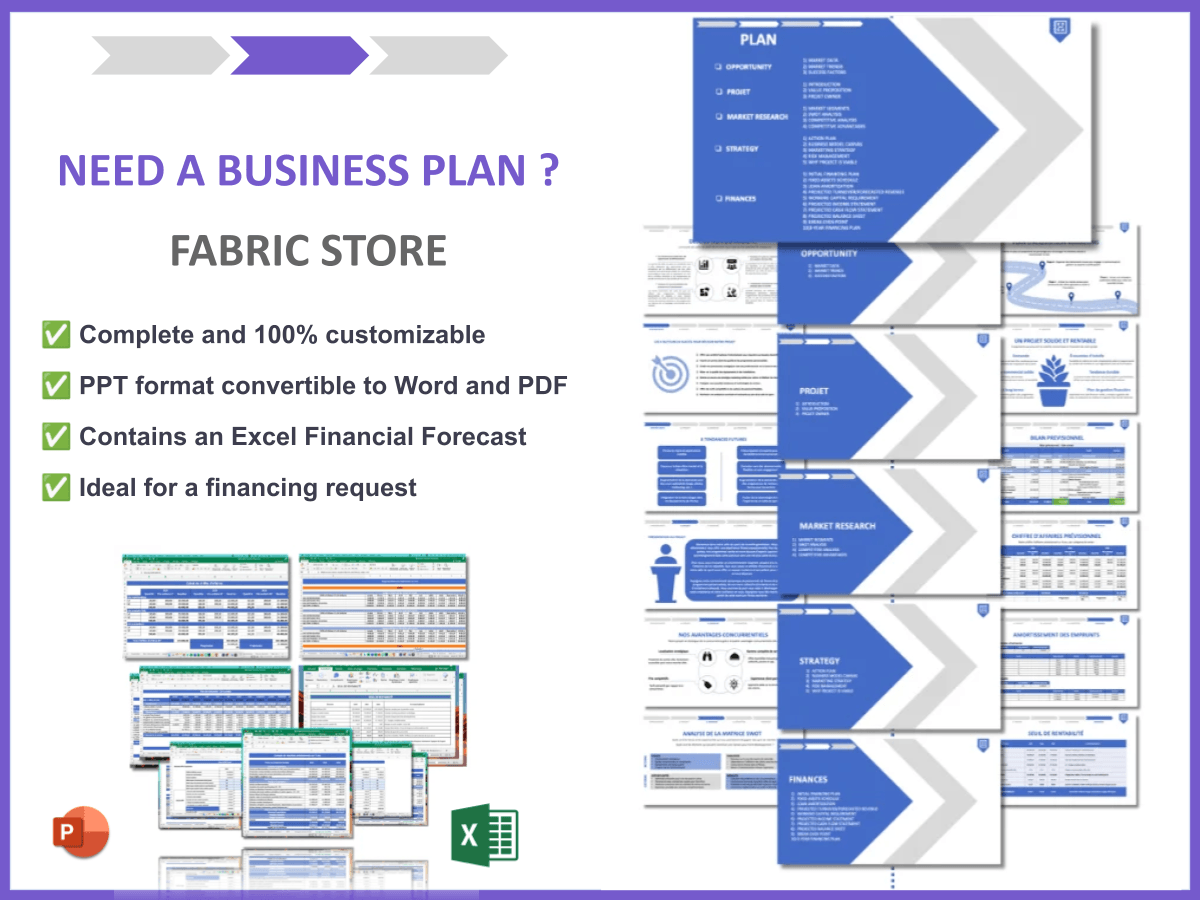Why Should You Have a SWOT Analysis for Your Fabric Store?
Are you thinking about starting a fabric store? You’re not alone! The fabric industry is booming, with countless entrepreneurs eager to jump into this colorful world. But before you dive in, it’s crucial to understand the landscape you’re entering. A SWOT analysis for your fabric store is essential because it helps you identify your strengths, weaknesses, opportunities, and threats. This strategic planning tool provides insights that can guide your business decisions and help you stand out in a crowded market.
Here are ten reasons why you should conduct a SWOT analysis for your fabric store:
- Understand your unique selling points.
- Identify areas for improvement.
- Explore potential market opportunities.
- Recognize external threats to your business.
- Make informed strategic decisions.
- Enhance competitive advantage.
- Improve customer satisfaction.
- Align business goals with market demands.
- Plan for future growth.
- Minimize risks and uncertainties.
How Do You Write a SWOT Analysis for Your Fabric Store?
Writing a SWOT analysis is simpler than you might think. It involves four key components: strengths, weaknesses, opportunities, and threats. Let’s break it down:
Strengths
Strengths are the internal factors that give your fabric store an advantage over competitors. This could be your unique product selection, exceptional customer service, or a loyal customer base.
Weaknesses
Weaknesses are areas where your store may be lacking compared to others. This might include limited marketing efforts or a smaller inventory than competitors.
Opportunities
Opportunities are external factors you can leverage to grow your business. This could involve tapping into online sales or expanding your product range to meet customer demands.
Threats
Threats are external challenges that could impact your store negatively. This might include economic downturns or increased competition from online retailers.
SWOT Example N°1 for Fabric Store
In this section, we will explore a real-world example of a fabric store’s SWOT analysis.
| SWOT | Analysis |
|---|---|
| Strengths | Unique fabric selection, strong local presence |
| Weaknesses | Limited online visibility, higher price points |
| Opportunities | E-commerce expansion, partnerships with local designers |
| Threats | Competition from large retailers, economic fluctuations |
- This example highlights the need for fabric stores to adapt to changing market conditions.
- A strong local presence can be leveraged to build community relationships.
- E-commerce presents a significant growth opportunity.
- Price competition from large retailers is a real threat.
- A unique fabric selection can draw in niche customers, making it a key strength.
- Limited online visibility might restrict customer reach, indicating a weakness.
- Partnering with local designers can enhance brand recognition and create new opportunities.
- Economic fluctuations pose a threat, as they can impact consumer spending patterns.
SWOT Example N°2 for Fabric Store
Let’s take a look at another fabric store’s SWOT analysis.
| SWOT | Analysis |
|---|---|
| Strengths | Excellent customer service, knowledgeable staff |
| Weaknesses | Limited marketing budget |
| Opportunities | Growing interest in DIY crafts |
| Threats | Rising costs of materials |
- This store thrives on customer service, which sets it apart from competitors.
- A limited marketing budget might restrict growth.
- The DIY trend can be capitalized on for increased sales.
- Material costs pose a potential threat to profitability.
- Excellent customer service creates a loyal customer base, enhancing this store's strengths.
- A limited marketing budget could hinder brand visibility, highlighting a weakness.
- The rising interest in DIY crafts offers a significant opportunity for product expansion.
- Rising costs of materials could impact pricing strategies, presenting a threat to margins.
SWOT Example N°3 for Fabric Store
Here’s another example to consider for a fabric store’s SWOT analysis.
| SWOT | Analysis |
|---|---|
| Strengths | Strong brand reputation, diverse product range |
| Weaknesses | Inefficient supply chain |
| Opportunities | Expansion into new markets |
| Threats | Seasonal demand fluctuations |
- A strong brand reputation can drive customer loyalty.
- An inefficient supply chain can lead to lost sales.
- New market expansion could offer significant growth potential.
- Seasonal demand can complicate inventory management.
- A well-recognized brand helps in attracting new customers, marking a key strength.
- Supply chain inefficiencies may result in delays, highlighting a critical weakness.
- Entering new markets can provide fresh revenue streams and expand the customer base.
- Seasonal fluctuations can impact sales consistency, representing a threat to stability.
SWOT Example N°4 for Fabric Store
Next, let’s analyze a different fabric store.
| SWOT | Analysis |
|---|---|
| Strengths | Innovative product offerings, strong online presence |
| Weaknesses | High dependency on suppliers |
| Opportunities | Increased interest in sustainable fabrics |
| Threats | Regulatory changes affecting imports |
- Innovative offerings keep the product line fresh and exciting.
- Supplier dependency could lead to inventory issues.
- Sustainability is a growing trend that can be tapped into.
- Regulatory changes may impact product availability.
- Innovative product offerings can attract a diverse customer base, showcasing strength.
- Relying heavily on suppliers can pose risks to inventory stability, marking a weakness.
- The trend towards sustainable fabrics provides a valuable opportunity for differentiation.
- Changes in regulations could disrupt supply chains, representing a significant threat.
SWOT Example N°5 for Fabric Store
Here’s another SWOT analysis example for your consideration.
| SWOT | Analysis |
|---|---|
| Strengths | Strong community engagement, loyalty programs |
| Weaknesses | Limited online marketing strategies |
| Opportunities | Collaborations with local artisans |
| Threats | Economic downturn affecting consumer spending |
- This store thrives on community engagement, which fosters customer loyalty.
- A limited online marketing strategy might restrict growth.
- Collaborating with local artisans can enhance product offerings.
- Economic downturns can lead to reduced sales.
- Strong community ties help build a loyal customer base, marking a significant strength.
- A lack of online marketing strategies can hinder visibility and reach, representing a weakness.
- Collaborations with local artisans can create unique products, offering valuable opportunities.
- Economic challenges may affect overall consumer spending, posing a threat to sales.
SWOT Example N°6 for Fabric Store
Let’s dive into yet another example.
| SWOT | Analysis |
|---|---|
| Strengths | Personalized customer service, local sourcing |
| Weaknesses | Small physical store size |
| Opportunities | Online tutorials and classes |
| Threats | Increasing competition from online stores |
- Personalized service creates a unique shopping experience.
- A small store size may limit inventory options.
- Online tutorials can attract new customers.
- Online competition is a growing concern.
- Personalized customer service enhances customer satisfaction, showcasing a key strength.
- A small store size can restrict the variety of products offered, highlighting a weakness.
- Offering online tutorials can attract DIY enthusiasts and expand the customer base.
- The rise of online stores poses a competitive threat that must be addressed.
SWOT Example N°7 for Fabric Store
Here’s another case study for your analysis.
| SWOT | Analysis |
|---|---|
| Strengths | Well-established customer base, unique fabric designs |
| Weaknesses | Limited advertising reach |
| Opportunities | Hosting community events |
| Threats | Changes in consumer preferences |
- A loyal customer base is a huge asset.
- Advertising reach is critical for growth.
- Community events can boost visibility.
- Consumer preferences can shift quickly.
- A well-established customer base provides stability and repeat business, marking a strength.
- Limited advertising reach can hinder awareness and growth, highlighting a weakness.
- Hosting community events can enhance engagement and attract new customers.
- Rapid changes in consumer preferences can pose a significant threat to product sales.
SWOT Example N°8 for Fabric Store
Let’s look at another example.
| SWOT | Analysis |
|---|---|
| Strengths | Exclusive fabric lines, knowledgeable staff |
| Weaknesses | Lack of social media presence |
| Opportunities | Trend towards home sewing |
| Threats | Supply chain disruptions |
- Exclusive lines can attract niche markets.
- A social media presence is crucial for engagement.
- Home sewing is becoming popular again.
- Supply chain issues can disrupt operations.
- Exclusive fabric lines create a unique selling proposition, showcasing a strength.
- A lack of social media presence can limit brand engagement and outreach, marking a weakness.
- The growing trend towards home sewing presents a valuable opportunity for sales.
- Supply chain disruptions can negatively impact product availability, representing a significant threat.
SWOT Example N°9 for Fabric Store
Here’s a ninth example for your consideration.
| SWOT | Analysis |
|---|---|
| Strengths | High-quality materials, expert tailoring services |
| Weaknesses | Inconsistent inventory management |
| Opportunities | Expansion into online sales |
| Threats | Market saturation |
- High-quality materials can attract discerning customers.
- Inventory management is key to customer satisfaction.
- Online sales can provide new revenue streams.
- Market saturation can increase competition.
- High-quality materials establish a reputation for excellence, marking a key strength.
- Inconsistent inventory management may lead to customer dissatisfaction, highlighting a weakness.
- Expanding into online sales opens new avenues for growth and revenue.
- Market saturation can make it difficult to stand out, representing a significant threat.
SWOT Example N°10 for Fabric Store
Finally, let’s analyze one last example.
| SWOT | Analysis |
|---|---|
| Strengths | Affordable pricing, diverse clientele |
| Weaknesses | Limited brand recognition |
| Opportunities | Collaborations with fashion designers |
| Threats | Fluctuating fabric prices |
- Affordable pricing can attract a wide audience.
- Brand recognition is essential for growth.
- Designer collaborations can enhance credibility.
- Fabric price fluctuations can affect margins.
- Affordable pricing strategy makes products accessible, showcasing a strong advantage.
- Limited brand recognition can hinder customer trust and loyalty, marking a weakness.
- Collaborating with fashion designers can elevate the brand and attract new customers.
- Fluctuating fabric prices can impact profitability and pricing strategies, representing a threat.
Conclusion
In summary, conducting a SWOT analysis for your fabric store is vital for understanding your business landscape. It helps you identify where you stand and where you need to go. By utilizing the examples provided, you can inspire your own analysis and adapt it as your business evolves. Remember, a thorough SWOT analysis not only guides your strategic decisions but also enhances your competitive edge in the market.
If you’re looking for a comprehensive guide to starting your fabric store, consider checking out this business plan template that offers a solid foundation. Additionally, you can explore our articles on How To Start a Fabric Store? and How To Write a Fabric Store Marketing Plan? to further enhance your knowledge and planning efforts.
FAQ
1. What is a SWOT analysis?
A SWOT analysis is a strategic tool that helps businesses identify their strengths, weaknesses, opportunities, and threats in the market.
2. Why is a SWOT analysis essential for a fabric store?
It provides insights into your fabric store’s position in the market, helping you make informed decisions and strategies for growth.
3. How frequently should I perform a SWOT analysis?
It’s recommended to conduct a SWOT analysis annually or whenever significant changes occur in your business environment.
4. Can I apply SWOT analysis to other businesses?
Yes! The SWOT framework is versatile and can be used across various industries and business types.
5. What should I focus on in the strengths section?
Identify what makes your fabric store unique, such as your product selection or exceptional customer service.
6. How can I uncover opportunities for my fabric store?
Look for emerging trends in the market, customer feedback, and areas where your competitors may be lacking.
7. What are common threats to fabric stores?
Common threats include economic downturns, intense competition, and shifting consumer preferences.
8. How should I address weaknesses identified in my SWOT analysis?
Develop a plan to improve or mitigate these weaknesses, whether through enhanced marketing or operational changes.
9. Is it beneficial to involve my team in the SWOT analysis?
Absolutely! Involving your team can provide valuable perspectives and enhance the quality of the analysis.
10. Can a SWOT analysis assist in business planning?
Definitely! It offers a clear picture of your business landscape, aiding in strategic planning and goal setting for your fabric store.







